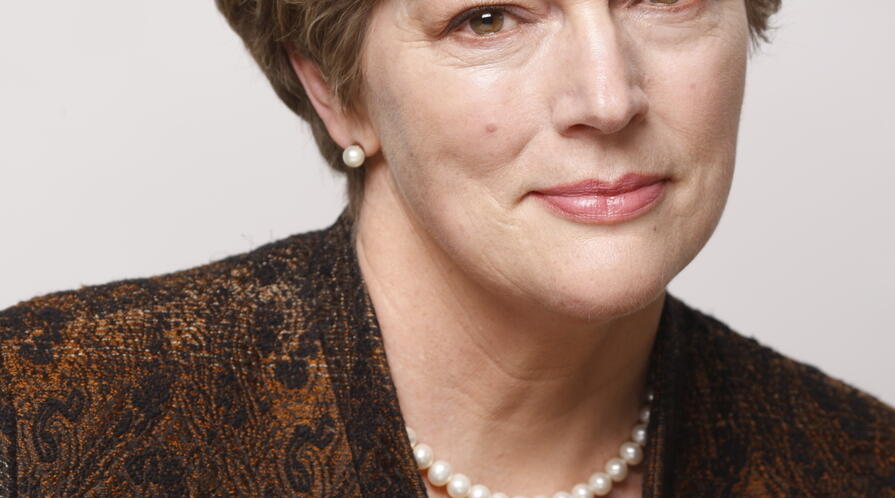Kathleen Stephens, 2013–14 Koret Fellow, to join the Korean Studies Program

Kathleen Stephens, former U.S. Ambassador to the Republic of Korea, will join the Korean Studies Program (KSP) at Stanford University’s Walter H. Shorenstein Asia-Pacific Research Center (Shorenstein APARC) as the program’s 2013–14 Koret Fellow.
"Kathy Stephens was perhaps the most popular American ambassador ever with South Koreans, because of her long experience, deep knowledge, and great love for Korea and its people," says Shorenstein APARC director Gi-Wook Shin. "As one of the United States' most experienced and senior professional diplomats, she will make a major contribution to the research, educational, and outreach efforts of the Korean Studies Program and Shorenstein APARC in the coming year."
Ambassador Stephens aims to write a book about aspects of Korea’s modern journey, with particular attention to South Korea’s political development, to the impact of cultural and social change on its politics, and to the role of the United States. The book will draw from her experience over the decades working in and on Korea, buttressed and expanded upon by research using both English and Korean-language sources. In the winter quarter she will teach Issues in U.S.-Korea Relations, a Center for East Asian Studies (CEAS) course.
Ambassador Stephens recently completed thirty-five years as a career diplomat in the U.S. Foreign Service. She was Acting Under Secretary of State for Public Diplomacy and Public Affairs in 2012, and U.S. Ambassador to the Republic of Korea, 2008 to 2011.
Ambassador Stephens has served in numerous posts in Washington, Asia, and Europe. From 2005 to 2007 she was Principal Deputy Assistant Secretary of State for the Bureau of East Asian and Pacific Affairs (EAP). While Deputy Assistant Secretary of State in the Bureau of European and Eurasian Affairs (EUR) from 2003 to 2005, she focused on post-conflict and stabilization issues in the Balkans. Other Washington assignments included Director for European Affairs at the National Security Council during the Clinton Administration, Senior United Kingdom Country Officer in the European Bureau, and Director of the State Department’s Office of Ecology and Terrestrial Conservation in the Bureau of Oceans, Environment and Scientific Affairs.
Ambassador Stephens’ overseas postings have included Deputy Chief of Mission at the U.S. Embassy in Lisbon, Portugal (1998–2001), and U.S. Consul General in Belfast, Northern Ireland (1995–1998) during the consolidation of ceasefires and negotiation of the Good Friday Agreement. Earlier foreign assignments included consular and public affairs officer in Guangzhou, China, chief of the internal political unit in Seoul, principal officer of the U.S. Consulate in Busan, Korea, and political officer in fracturing Yugoslavia.
Ambassador Stephens has received numerous State Department awards, including Linguist of the Year in 2010, and the 2009 Presidential Meritorious Service Award. Other awards and recognition include the Korean government’s Sejong Cultural Prize (2013), the Korean YWCA’s Korea Women’s Leadership “Special Prize” Award (2010), and in 2011 the Pacific Century Institute’s Building Bridges Award, the Outstanding Achievement Award from the American Chamber of Commerce in Korea, and the Kwanghwa Medal of Diplomatic Merit from the Korean government. Her book, Reflections of an American Ambassador to Korea, based on her Korean-language blog, was published in 2010.
Ambassador Stephens was born in El Paso, Texas and grew up in Arizona and Montana. She holds a BA (Honors) in East Asian studies from Prescott College, an MA from Harvard University, and honorary doctoral degrees from Chungnam National University and the University of Maryland. Ambassador Stephens studied at the University of Hong Kong and was an instructor at the Outward Bound School of Hong Kong. She was a Peace Corps volunteer in Korea in the 1970s.
The Koret Fellowship was established in 2008 through the generosity of the Koret Foundation to promote intellectual diversity and breadth in the KSP by bringing leading professionals in Asia and the United States to Stanford to study U.S.-Korea relations. The fellows conduct their own research on the bilateral relationship, with an emphasis on contemporary relations, with the broad aim of fostering greater understanding and closer ties between the two countries.
